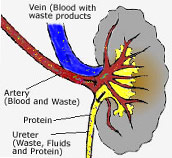Nephrotic
Syndrome
is a
kidney
disorder
which is
characterized
by
1.
Abnormal
protein
leak
2. Low
levels
of
proteins
in blood
(due to
protein
leakage)
3.
Increased
levels
of lipid
4.
Swelling
of body
parts
(called
edema).
The term
Nephrotic
Syndrome
is
coined
from two
words:
Nephros
(in
Greek)
meaning
kidney
and
Syndrome
denoting
a group
of
symptoms.
Nephrotic
Syndrome
is a set
of
symptoms
related
to
kidney
dysfunction,
and not
a
disease,
in and
of
itself.
Nephrotic
Syndrome
is a
disorder
characterized
by loss
of
proteins
in the
urine.
In
realism,
Nephrotic
Syndrome
can be
the
first
sign of
various
diseases
that
damage
the
kidneys,
especially
tiny
blood-filtering
units (glomeruli)
in the
kidneys,
where
urine is
formed.
This
causes
fall in
the
protein
levels
in the
blood,
and
water to
move
into
body
tissues,
causing
swelling
and
bloating
of body
(edema/Oedema).
To know
what is
Nephrotic
Syndrome,
let us
first
briefly
understand
the
structure
and
function
of the
kidneys.
|

|
The
kidneys
are two
bean-shaped
organs
found in
the
lower
back.
They are
about
the size
of a
fist.
The
kidneys
are like
bodys
filters,
which
remove
impurities
or
wastes
from the
blood
via the
urine
and
return
the
cleaned
blood
back to
the
body.
Each of
these
kidneys
has
millions
of units
to
filter
blood
called
glomeruli.
Glomeruli
are tiny
blood
vessels
that
form a
meshwork
in the
kidney
through
which
blood is
strained
to
filter
out
excess
water
and
waste
products.
When the kidneys are working well, they clean the blood |
|
and get
rid of
waste
products,
excess
salt,
and
water.When
diseased,
the
kidneys
may get
rid of
things
that the
body
needs to
keep,
such as
proteins
and
blood
cells.
The
normal
architecture
of the
glomeruli
prevents
a
majority
of
protein
from
getting
filtered
into the
urine
and this
holds
protein
in the
blood.
Protein
help the
blood
soak up
water
from
tissues.
But
kidneys
with
damaged
filters
may let
protein
leak
into the
urine.
As a
result,
not
enough
protein
is left
in the
blood to
soak up
the
water.
The
water
then
moves
from the
blood
into
body
tissues,
producing
swelling.
This
swelling
may be
most
noticeable
around
the
eyes,
legs,
hands,
belly,
etc.
Normally,
a person
loses
less
than 150
mg of
protein
in the
urine in
a
24-hour
period.
However,
patient
of
Nephrotic
Syndrome
will
loose
more
than 3.5
grams or
more of
protein
during a
24-hour
period,
or 25
times
the
normal
amount.
As body
looses
this
vital
protein
in the
urine,
this
results
in drop
of
protein
in the
blood
called
hypoproteinemia
or
hypoalbuminemia,
another
cardinal
feature
of
Nephrotic
Syndrome.
Hypercholesterolemia
(high
blood
cholesterol)
is
common
in Nephrotic
Syndrome.
In
addition
to
albumin,
other
important
enzymes
involved
in
cholesterol
metabolism,
slip
through
the
glomeruli,
which
contribute
to high
blood
cholesterol.
How
common
is the
condition
About
two in
every
10,000
people
experience
Nephrotic
Syndrome.
Nephrotic
Syndrome
can
affect
children
and
adults
of any
age. In
children
it is
more
frequently
encountered
between
2-5
years of
age. The
disease
is more
common
in males
than
their
female
counterparts.
The
condition
tends to
be more
common
in
families
with a
history
of
allergies.
This
notorious
condition
becomes
more
distressing
because
of its
chronic
nature
and
tendency
for
frequent
relapse
and
recurrence.
Homeopathy,
a
holistic
branch
of
medicine
has
promising
role to
offer in
vast
majority
of
chronic
diseases,
one
amongst
them
being
Nephrotic
Syndrome.
This
individual
specific
and not
disease
specific
branch
of
medicine
treats
patient
effectively,
gently,
without
producing
any side
effects. |
|
|
|
Click
here for Case
Studies |
|
|